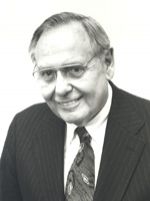
Dr. George Reader, 1919-2005
Dr. George Reader, the Livingston Farrand Professor Emeritus of Public Health and Professor Emeritus of Medicine, passed away on October 13 at his home in Rye, N.Y. He was 86.
A lifelong Cornellian, Dr. Reader's research focused on socio-economic influences on illness and the delivery of medical care. He was an early champion of comprehensive care, and helped shape public health policy on state and national levels.
From 1961 to 1965, Dr. Reader served as chairman of the human ecology section of the National Institutes of Health. In 1966, he served as an advisor to the Social Security Administration during the Johnson Administration, influencing the formulation and eventual passage of Medicare legislation. Dr. Reader was a consultant for a number of federal agencies, including the U.S. Office of Economic Opportunity (1967); the Office of the Secretary in the Department of Health, Education and Welfare (HEW) (1967-1968); and the Health Services and Mental Health Administration at HEW (1970-1972). In 1971, he was appointed co-chairman of the technical committee on training of the White House Conference on Aging. From 1974 to 1984, Dr. Reader was a member of the New York State Governor's Health Advisory Council.
Born and raised in Brooklyn, N.Y., Dr. Reader always knew he wanted to be a doctor. When he was 10, his father gave him a microscope, which he used to study raindrops in the garden. With a natural curiosity in science and medicine, Dr. Reader enrolled at Cornell University in Ithaca in 1936, and graduated with a degree in animal biology. It was there that he also met his future wife, Helen, to whom he had been married for 63 years.
Soon after college, he enrolled at Cornell University Medical College, graduating in three years. Toward the end of his internship at The New York Hospital in 1944, Dr. Reader, already a Naval Lieutenant Junior Grade, was called to active duty. By the end of World War II, he had been promoted to Lieutenant and became commanding officer of a medical detachment.
In 1947, Dr. Reader returned to the New York Hospital-Cornell Medical Center to complete his residency, and stayed with Cornell for the next 45 years. He served with distinction in a number of roles, moving up the academic and clinical tracks to eventually become chairman and physician-in-chief for the Department of Public Health from 1972 to 1992. In 1992, Dr. Reader was named recipient of the Maurice R. Greenberg Distinguished Service Award, the highest honor bestowed by the Medical Center. "If we were to mention all the honors George has received, all his appointments and memberships in distinguished organizations, we'd be here till dawn," said Dr. Bob Michels, past dean of the Medical College, the night Dr. Reader received his Greenberg Award.
"He was a superb and compassionate clinician, skilled teacher, and dedicated researcher," said Dr. Alvin Mushlin, chairman of the Department of Public Health. "He was beloved and respected by all."
Each patient deserves comprehensive care from one or several health professionals—care that is coordinated, continuous, complete and compassionate for every episode of illness.
—Dr. George Reader

